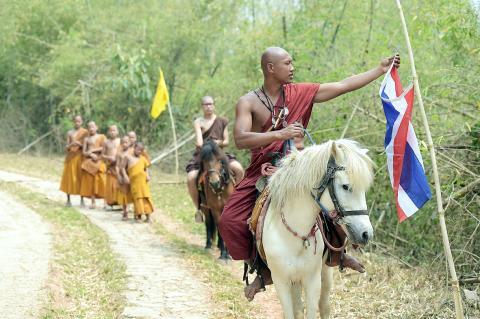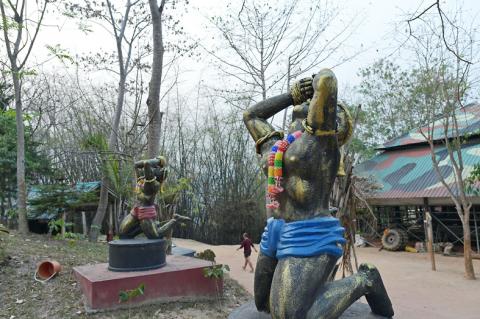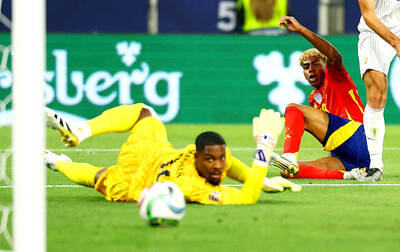Every morning in Thailand’s far north, a convoy of orange-robed Buddhist monks and novices riding on horseback leave their mountain-top temple in the kingdom’s notorious Golden Triangle region to collect alms.
At first glance, these equestrian ascetics look like a throwback to a forgotten era — but they are in fact part of an innovative drive to help young boys in this drug-ravaged region escape addiction through horses, Thai boxing and meditation.
Once famed for its opium and heroin, the main substance manufactured and trafficked through the Golden Triangle — and the main source if addiction in the area — is now methamphetamine.

Photo: AFP
“I barely had food to eat because my dad was a drug addict and didn’t work,” said Ponsakorn Mayer, known by his nickname Tawan, one of the novices who rides along the steep slopes surrounding the monastery every day.
Like many young boys in this mountainous region where rampant drug-trafficking has decimated successive generations, Tawan sought refuge at the “Temple of the Golden Horse.”
Now, his days are packed with meditation, horse riding and traditional Muay Thai.

Photo: AFP
Perched on a lush, green mountain in the kingdom’s northernmost Chiang Rai Province, the temple sits in the heart of the so-called Golden Triangle — an area comprising parts of northern Thailand and neighboring Myanmar and Laos.
The temple’s monks have become social workers of a sort in the isolated region where few government services reach.
With a Muay Thai champion to provide instruction and a stable of horses to be cared for and exercised, the monastery aims to stimulate the young boys who come from local families hit by drug addiction, alongside the more mainstream classes provided by the temple.
“Without this temple, I wouldn’t have seen how vibrant life can be ... my small village is full of drug problems,” 19-year-old Tawan said.
The majority of novices, who often suffer from malnutrition when they arrive at the temple, are orphans or were abandoned there by their drug-taking parents.
“Hill tribe people have tough lives; it’s partly why they often take drugs and struggle to care for their kids,” said Pra Sutipong, the principal monk at the temple.
The UN Office on Drugs and Crime estimates that each year in this area more than 1.5 billion yaba pills — the Thai name for a tablet containing methamphetamine and caffeine — are manufactured in the vicinity.
This happens mostly in small mobile laboratories in isolated jungle areas Myanmar’s Shan State.
“Drugs are the big problem in the northern region of Thailand... There are not enough rehab centers,” said Apisak Wittayanookulluk, deputy director of Thanyarak rehab center in Chiang Mai.
“Prevention needs to be developed especially in schools as nowadays users and dealers are getting younger and younger,” he said.
Many youngsters who emerge from the temple’s education system, like Tawan, want to take what they have learned back to their communities.
“At first, I just wanted to stay here, but there are many problems in my home,” he said, adding that he would like to help local children avoid falling into the drug trap.
“There are still not many alternative jobs. Most people sell and traffic drugs,” he said.
Tawan says that tending the animals and Muay Thai helped keep the children happy and engaged in a way that traditional classroom learning alone might not have.
At the temple, the novices spend much of their time on routine daily tasks: feeding and caring for the animals, especially the horses.
They also study the basics of agriculture and cultivation, and help manage several hectares of cultivated vegetables that feed the residents of the monastery.
The ultimate goal of the program is to provide a sense of discipline and help the children see they are responsible for their own lives, temple monks say.
And the local community seems to approve of the results.
“The temple helps and supports poor children,” said Suk Namsaeng, 39, who lives in a village just a few kilometers from the complex where the monks come every morning to ask for alms.
“Most of the villagers don’t know how severe and harmful drugs are. Their parents have been drug addicts, so their children in the next generation think that it is normal,” he added.

Badminton world No. 3 Anders Antonsen clinched his first Indonesia Open title yesterday after beating Taiwan’s Chou Tien-chen, while South Korea’s An Se-young won her second championship in Jakarta. The 28-year-old Dane sank world No. 7 Chou at the Indonesian capital’s Istora Senayan arena, winning 22-20, 21-14 in a 60-minute match to secure the prestigious Super 1000 event. Antonsen came out on top in a tightly contested first game before cruising to victory in the second. In a more closely fought women’s singles final, South Korean ace and world No. 1 An fought back from one game down to beat China’s

Spain starlets Lamine Yamal and Nico Williams dazzled on Thursday as La Roja beat France 5-4 in a thriller in Stuttgart, Germany, to set up a UEFA Nations League final with Portugal. Yamal bagged a brace, while Williams scored and provided an assist as the two wingers cut France’s makeshift defense to ribbons. Mikel Merino and Pedri were also on the score sheet for the UEFA Euro 2024 champions. Kylian Mbappe netted a second-half penalty, but Spain were 5-1 up and cruising, before Les Bleus suddenly woke up as their opponents took their foot off the pedal. France’s three late goals — a

Italy crashed to a 3-0 loss away to Norway, as the four-time FIFA World Cup champions made a disastrous start to their 2026 World Cup qualifying campaign on Friday, while Belgium had to settle for a draw in North Macedonia. Alexander Sorloth, Antonio Nusa and Erling Haaland all scored in the first half in pouring rain in Oslo as Norway made it a night to forget for Italy, who missed out on the past two World Cups. “I have no explanation. Our supporters don’t deserve this kind of match. We need to do some soul-searching. It’s unacceptable,” Italy captain and goalkeeper Gianluigi

The Crusaders yesterday produced a clinical performance in difficult conditions to beat the Queensland Reds 32-12 and claim home advantage in next week’s Super Rugby semi-finals. Lock Scott Barrett and prop Tamaiti Williams scored first-half tries to reward an outstanding performance from the Crusaders’ forwards in wet, slippery conditions and bitterly cold temperatures. Scrumhalf Noah Hotham defied the conditions in the second half to score a superb solo try and, after kicking a conversion and penalty to make the score 22-0 at the hour mark, flyhalf Rivez Reihana scored a try which took the game beyond the Reds. “Typical Christchurch weather, cold, wet